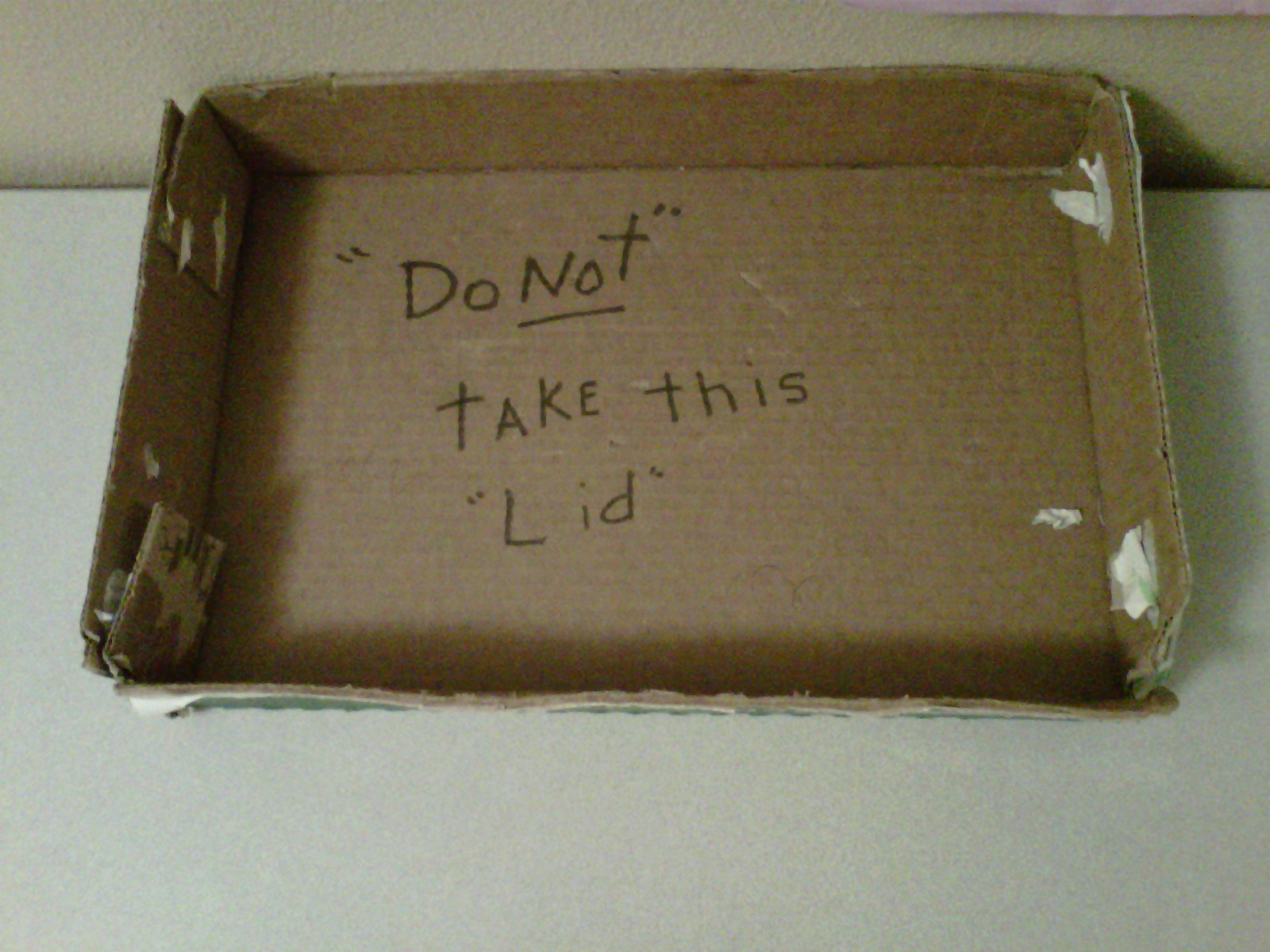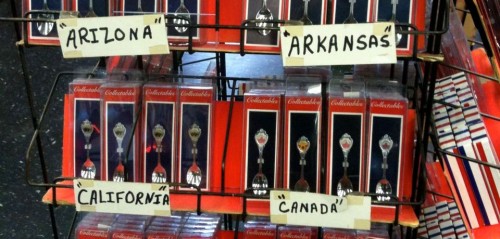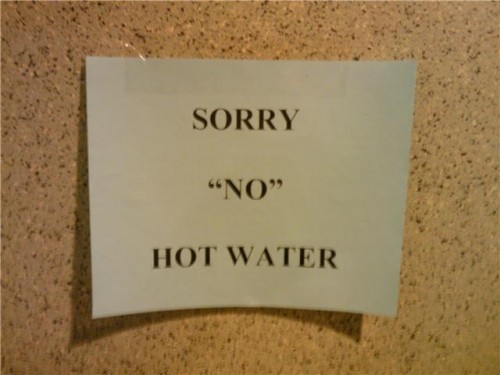Craft Notes
“Htmlgiant blog post about the use of quotes”

The “Blog” of “Unnecessary” Quotation Marks is a celebration of obtuse and/or excess rhetoric, offered as utilitarian measure by various small-time vendors. I appreciate the joyous examples, given their contrast to the more affected self-conscious use of quotation marks used by writers today. It gets me thinking about the intent of syntax: where meaning is augmented, or even fractured, by the play of the writer. In “Do Not” take this “Lid”, it seems they are conceding to the questionable function of said “Lid,” and asking for liberty in calling it such a thing. “Do Not“ may be quoted to suggest an awareness in the cliche, or maybe in solidarity to it. Notice only the appropriated terms are capitalized, as if the true disposition of such assertion were of a more modest nature. I’m probably reading too into this, I just like thinking about the minutiae of sentences often taken for granted.

“Canada” is a funny place; they spell their words the french way (i.e. “colour”) and use the English convention of placing quotes before the comma or period (i.e. “Hockey”, he said) — as supposed to after, which is the “American” way (i.e. “Baseball,” he said). I’m currently reading American turned brit Henry James, who single quotes conversations while double quoting both third-person omniscient key words and sub-conversations narrated within former single quotes, not to mention the endless dance of semicolons — basically, going through syntactical hell for an occasional allusion of a sex scene, thanks Henry. I guess “England” is indeed really different from “America.” A long time ago people drew lines into sand spotted with blood; today, there is Merchant Ivory.

Sorry, there’s no hot water, but it’s not our fault. The concept of “no” existed far before us, preceding human plight. We just happen to be crossing paths with the universe’s “absolute no.” Quotes absolve us from responsibility (cunt is horrible, but “cunt” is okay); they say “no, I’m not saying this, the quotes are.” It turns an author into his own ghost writer. Irony is a urinal on a pedestal, self propagating its bare meaning in transparent washes. The true oulipo of today would be to just write. I’d like to read a book without the constant wink of quotes, parenthetical hugs, artsy italics — and no phallic em dash please — just words standing alone, naked, inherent with inevitable meaning. “Thanks,” that would be cool.

JFC like sewing needles in your tea.
“Funny,” he “thought” to “himself”; but thought-provoking, “too.” Fuck.
There should be a Blog of Unnecessary Capitalization. That’s my favorite. Accidental Emily Dickinson all over the place.
When I type quotation marks, I think to myself, “Is this trip really necessary?” Then I usually end up not using them. Quotation marks should be used sparingly for the simple reason that they can really clutter up the text and make it hard to read, especially when every other word has them.
I thought this was going to be another post about Tao Lin.
Love this. Even better is the sign with the asterisk. You go to the bottom of the sign to see what is being referred to. Nothing.
http://media.bonnint.net/seattle/2/254/25424.jpg
that shows up in my neighborhood, i go buy 4 more rotties.
[…] of “Unnecessary” Quotation Marks sometime last year and then, gladly, today HTMLGIANT reminded me of it again. It’s such great fun to “look at it” for […]
Great post, Jimmy. Though as an inveterate and addicted user of unnecessary quotations, not for irony’s sake but for the critical acumen they lend, I’m not sure I track with the blanket claim that quotes absolve us from responsibility: “cunt” may be okay and cunt not but if someone calls me a “cunt”, like that, the quotes become their wax eyebrows. I’m also not sure about this: “The true oulipo of today would be to just write.” If so, is this a good sentence? I doubt it but don’t quote me. Still, evocative thinking: provocative thought meets exquisite sentences. Especially: “Irony is a urinal on a pedestal, self propagating its bare meaning in transparent washes.” I itch to write sentences like that.
The misuse of scare quotes on this blog gets pretty annoying.
In what context specifically, Lincoln? I mean, is there an example of the kind of misuse you see that irks you?
That sign shows awesome use of not just scare quotes but language, Capitalization, punctuation, font and layout. I dig center-justified.
I’ve missed you, Jimmy Chen. Thank you.
I can’t speak for Lincoln, but I feel the same way and I see it mostly as laziness. People do it for emphasis when, really, they just need to express themselves better so they don’t have to use quotes for every other word. That or trust people to understand what they mean.
There also seems to be a group on here that thinks it’s some kind of radical way of questioning meaning, but I don’t really get that. I mean, aren’t we all constantly examining/questioning meaning? We are writers.
Also, I am a crabby old lady who likes to diagram sentences for fun.
JFC like sewing needles in your tea.
“Funny,” he “thought” to “himself”; but thought-provoking, “too.” Fuck.
There should be a Blog of Unnecessary Capitalization. That’s my favorite. Accidental Emily Dickinson all over the place.
I see it used in ways that doesn’t seem to mean anything. I don’t want to like call anyone out, but people seem to scare quote random words or phrases. One example I remember is someone discussing an author and comparing their new work to their “pre-[book title]” work. Why would you quote “pre-[title]”? It wasn’t a phrase anyone had used, there wasn’t some shade of meaning being acknowledged, hell it wasn’t even being used for emphasis…
Feels like an affectation.
When I type quotation marks, I think to myself, “Is this trip really necessary?” Then I usually end up not using them. Quotation marks should be used sparingly for the simple reason that they can really clutter up the text and make it hard to read, especially when every other word has them.
I thought this was going to be another post about Tao Lin.
Love this. Even better is the sign with the asterisk. You go to the bottom of the sign to see what is being referred to. Nothing.
http://media.bonnint.net/seattle/2/254/25424.jpg
that shows up in my neighborhood, i go buy 4 more rotties.
Great post, Jimmy. Though as an inveterate and addicted user of unnecessary quotations, not for irony’s sake but for the critical acumen they lend, I’m not sure I track with the blanket claim that quotes absolve us from responsibility: “cunt” may be okay and cunt not but if someone calls me a “cunt”, like that, the quotes become their wax eyebrows. I’m also not sure about this: “The true oulipo of today would be to just write.” If so, is this a good sentence? I doubt it but don’t quote me. Still, evocative thinking: provocative thought meets exquisite sentences. Especially: “Irony is a urinal on a pedestal, self propagating its bare meaning in transparent washes.” I itch to write sentences like that.
The misuse of scare quotes on this blog gets pretty annoying.
In what context specifically, Lincoln? I mean, is there an example of the kind of misuse you see that irks you?
That sign shows awesome use of not just scare quotes but language, Capitalization, punctuation, font and layout. I dig center-justified.
I’ve missed you, Jimmy Chen. Thank you.
I can’t speak for Lincoln, but I feel the same way and I see it mostly as laziness. People do it for emphasis when, really, they just need to express themselves better so they don’t have to use quotes for every other word. That or trust people to understand what they mean.
There also seems to be a group on here that thinks it’s some kind of radical way of questioning meaning, but I don’t really get that. I mean, aren’t we all constantly examining/questioning meaning? We are writers.
Also, I am a crabby old lady who likes to diagram sentences for fun.
I see it used in ways that doesn’t seem to mean anything. I don’t want to like call anyone out, but people seem to scare quote random words or phrases. One example I remember is someone discussing an author and comparing their new work to their “pre-[book title]” work. Why would you quote “pre-[title]”? It wasn’t a phrase anyone had used, there wasn’t some shade of meaning being acknowledged, hell it wasn’t even being used for emphasis…
Feels like an affectation.
they can def be a shorthand, yeah. like adverbials or other meta language tag ons. tics/ticks/tix.
I agree that the use of scare quotes should be prudent and effectual. You’re right about this “pre-[book title]” example. But I feel like I understand the use of them to communicate trepidation about a word’s meaning or about the use of a word to communicate some intended meaning.
I don’t recall ever diagramming a sentence, although I’m sure some poor English teacher somewhere in my past tried to teach me. I do like to balance chemical equations, though, just for fun.
they can def be a shorthand, yeah. like adverbials or other meta language tag ons. tics/ticks/tix.
chen on fire
I agree that the use of scare quotes should be prudent and effectual. You’re right about this “pre-[book title]” example. But I feel like I understand the use of them to communicate trepidation about a word’s meaning or about the use of a word to communicate some intended meaning.
I don’t recall ever diagramming a sentence, although I’m sure some poor English teacher somewhere in my past tried to teach me. I do like to balance chemical equations, though, just for fun.
chen on fire
i once had a girlfriend wish me a happy “21st” birthday.
i once had a girlfriend wish me a happy “21st” birthday.